The Internal Revenue Service is trying to be more customer-friendly, but it’s not going to pay you for your feedback. The latest phishing scam starts with an e-mail masquerading as a request from the IRS to take an online customer satisfaction survey.
Dear Customer,
You've been selected to take part in our quick and easy 8 question
survey. In return we will credit $80.00 to your account — Just for your time!
Please spare two minutes of your time and take part in our online survey so we can improve our services. Don't miss this chance to change something.
Like all phishing schemes, this one is designed to steal your personal information. In this case, the bad guys are after your credit card number.
Click the link embedded in the e-mail and you’ll wind up at a bogus website that asks you to rate the IRS — on everything from courtesy and friendliness to speed of service — and supply your contact information.
Hit the submit button and you’ll land on a page that asks for your credit card information. The $80 “reward” for taking the survey will supposedly be credited to your account within the next 3 business days.
“We don’t pay people for surveys,” warns IRS Special Agent Kenneth Hines. After I told him about this phishing scam, the IRS was able to get this website shut down. But similar sites are sure to surface in no time.
An ongoing problem
Pretending to be the IRS is a favorite ploy of the cyber-thieves. They know there’s a good chance potential victims will read an e-mail that appears to be from the agency and respond to it.
Agent Hines tells me there have been about 435 IRS-related phishing schemes, originating in 55 countries, since November of 2005. Old ones keep making the rounds — as long as people keep falling for them — and new ones are always popping up.
One that’s been around for a long time looks like an IRS refund notice. Dan in Seattle got one of these e-mails last week.
After the last annual calculations of your fiscal activity we have determined that you are eligible to receive a tax refund of $109.30.
Please submit the tax refund request and allow us 6-9 days in order to process it. To access the form for your tax refund, please click here.
Dan told me the IRS logo and the return address of “refund@irs.gov” made it seem legitimate.
"I thought, hey, this is great,” he told me. “I could use $109.”
Dan clicked on the link and was taken to a site designed to look like the real IRS site. It asked for a lot of personal information, including his Social Security number and bank account number. It even asked for the code on the back on his credit card. That's when Dan bailed and called the IRS.
The IRS does not send e-mails regarding tax refunds and they don’t deposit refunds into credit card accounts. If you were owed money, the IRS would contact you the old-fashioned way, via snail mail.
Dan says because of this experience, he’s become a little more skeptical about all his e-mail. "I will not open anything that asks for any personal information.”
Spotting the IRS Phishing Scams
If you get an unsolicited e-mail that appears to be from the Internal Revenue Service – delete it! “The IRS does not solicit information from you by email,” agent Hines says.More Information:
IRS Warns Taxpayers of New E-mail Scams press release is .
